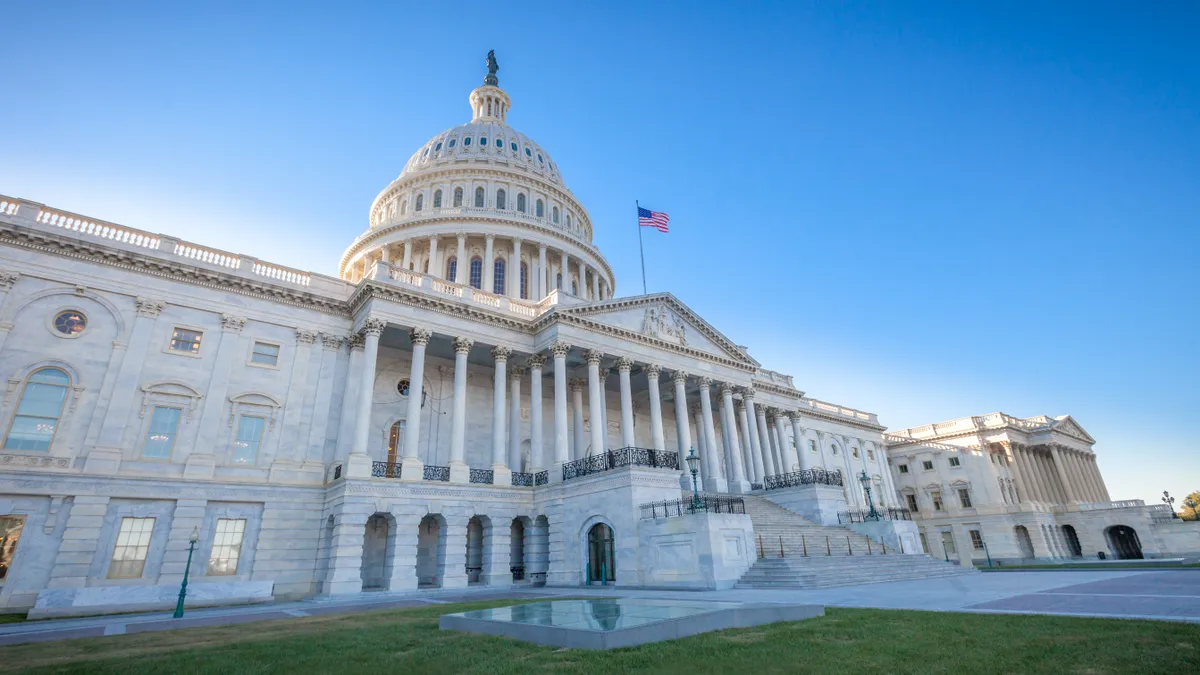Federal lawmakers introduced a bill last week that could ban non-essential PFAS in the U.S.
The Forever Chemical Regulation and Accountability Act would give manufacturers 10 years to phase out production of non-essential forever chemicals, as well as require them to eliminate all PFAS emissions from their facilities.
The bill is based on Minnesota’s impending ban on the sale or distribution of PFAS in the state, with exceptions for essential products like medical devices. The law, set to go into effect next year, is considered one of the broadest regulations against forever chemicals in the U.S.
“Protecting our environment and Americans from toxic hazards like PFAS is a matter of public health. PFAS surround us,” Sen. Dick Durbin, the bill’s sponsor in the Senate, said in a statement. “They are in the pots and pans we cook with, in our drinking water supply, in the air we breathe. We must act to ensure that harm brought on by these ‘forever chemicals’ is mitigated.”
The lawmakers will closely monitor exemptions to the proposed law, in which the use of PFAS in production is unavoidable, such as in medical devices and for national security purposes, Rep. Betty McCollum, the bill’s sponsor in the House, said in an April 18 news release.
Bill would increase oversight and reporting
The legislation would expand the reporting and recordkeeping requirements for PFAS producers under a section of the Toxic Substances Control Act.
In November, the Environmental Protection Agency passed a rule requiring companies that have had PFAS in their supply chains at any time since January 1, 2011 to submit information that helps the federal agency research, monitor and regulate the toxic substances.
However, that rule only requires manufacturers to report once. The draft proposal would require companies to report updates yearly at the federal level.
While the more frequent disclosures would be a bigger change for manufacturers, reporting information at the federal level would be simpler than at doing so at multiple state levels, Cally Edgren, senior director, sustainability, at a supply chain sustainability management company Assent, said in an email to Manufacturing Dive.
“On the plus side, it may make compliance with a patchwork quilt of state regulations easier than trying to manage 50 different varieties of PFAS laws,” Edgren said. “Advocacy for their uses as ‘essential’ will also be easier with one federal agency rather than dozens of state agencies.”
Industry groups such as the Society of Chemical Manufacturers and Affiliates pushed back against the proposal and the broad authority it gives the EPA.
“Entrusting the EPA with determining the ‘essential’ nature of chemicals raises concerns, as each federal agency operates within its own narrow scope of authority, potentially overlooking crucial data, facts, and impacts,” Robert Helminiak, vice president, legal and government relations at the Society of Chemical Manufacturers and Affiliates, said in a statement to Manufacturing Dive.
The bill would also make it easier for the public to file civil suits against PFAS makers for personal injuries or damages, and update bankruptcy provisions that make it easier for companies to evade responsibility.
If a manufacturer is found to have even one product containing PFAS, they are subject to potential lawsuits, Edgren said. The bill could drive more companies to discontinue producing anything with PFAS, making forever chemicals usage one day obsolete.
“Those that haven’t already started looking for PFAS in their materials and products are not only continuing to increase their own liability risks (government enforcement or even ‘citizen suits’) but also wasting time they need for redesign that will be needed due to growing regulations and part obsolescence,” Edgren said.
The Senate bill is currently with the Environment and Public Works Committee. The House bill is with the committees on Energy and Commerce; Oversight and Accountability; Science, Space, and Technology; Transportation and Infrastructure, and Armed Services.



















